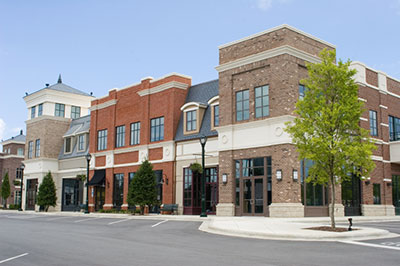TUESDAY, JULY 7, 2020
 So, you’ve finally done it, eh? You’re looking at purchasing a building or renting out a space to help your business grow! Congratulations. Whatever the reason, this is a big deal for your business. Because this is a big step, it’s probably safe to say that if something happened to this thing you’ve invested money in you’d want it put back together again, right? So, you’ve finally done it, eh? You’re looking at purchasing a building or renting out a space to help your business grow! Congratulations. Whatever the reason, this is a big deal for your business. Because this is a big step, it’s probably safe to say that if something happened to this thing you’ve invested money in you’d want it put back together again, right?
To protect your new building or rented space, it’s important to know the right questions to ask - here’s a few things to think through on how to buy insurance for your commercial building.
FIGURE OUT WHAT YOU WANT TO INSURE
Insurance is there to protect you from certain losses that may occur like wind, hail, fire, or flood. But before it pays out you have to figure out what items and the value limit that needs to be protected.
Do I want to insure my building?
If yes, do I want it insured at Replacement Cost or Actual Cash Value?
Are there items inside that building that need to be insured?
Is there any special equipment that I’ve bought for my business?
Does my landlord require that I insure the building through a Triple Net Lease? if so, what are their requirements?
THINK ABOUT THE RISKS YOUR PROPERTY FACES
Your commercial building or property may face different risks depending on where it’s located, the type of work that you’re doing, and the type of building.
For example, if you’re located on the coast as an Oceanfront Surf shop you might need to be protected again flood, hurricanes, and wind.
On the other hand, if you live in Oklahoma you wouldn’t necessarily be worried about hurricanes- but tornados may be a concern.
The risks your property face doesn’t just depend on its location, but also the type of building you want to insure. A historic building is going to be completely different than a brick and mortar office. The cost and valuation all depends on how old it is, age of the roof, and the materials with which it was built.
Different types of businesses may face different risks, or be threatened by the same risk to a different degree. For example, computer hackers are a risk to every business, but if you are a software developer, corruption to your files could destroy your business – as well as your reputation
TENANT VS PROPERTY COVERAGE
If you are renting the space then chances are the property owner likely has property insurance. However, that insurance will not cover any damage or loss to your property, including build outs, inventory, and business assets.
If you are leasing or renting your space, reach out to your landlord and find out what is and isn’t covered on their policy.
However, if you own the property, you typically can find coverage that covers the building itself as well as the assets inside.
Take an inventory of your business assets and determine which, if any, are already covered under an existing insurance policy.
Keep in mind that the more you want commercial property insurance to cover, the more you'll typically pay in terms of your premiums.
In addition to the building itself, consider whether you want to include the grounds surrounding the building and any other property, such as a warehouse used for storage or property in the open.
OTHER THINGS TO CONSIDER
A property policy typically covers a building or the assets inside, but it can also cover so much more. Consider this when looking at a property policy.
If the building were damaged and closed for an extended period of time would you still be able to operate, or would you be closed with no cash flow?
If overhead power lines were damaged would that disrupt your business and the revenue?
Are you in a flood area?
Do you have property that leaves the building and goes to job sites?
Is your building vacant or in the middle going to be remodeled?
Purchasing commercial insurance for your building can be confusing if you don’t know what you’re doing. That’s why it’s always important to work with an experienced, independent insurance agent that can guide you through the coverage you need.
Posted 11:24 PM
No Comments
Post a Comment |
|
Required
|
|
Required (Not Displayed)
|
|
Required
|
All comments are moderated and stripped of HTML.
|
|
|
|
|
|
NOTICE: This blog and website are made available by the publisher for educational and informational purposes only.
It is not be used as a substitute for competent insurance, legal, or tax advice from a licensed professional
in your state. By using this blog site you understand that there is no broker client relationship between
you and the blog and website publisher.
|
Blog Archive
|